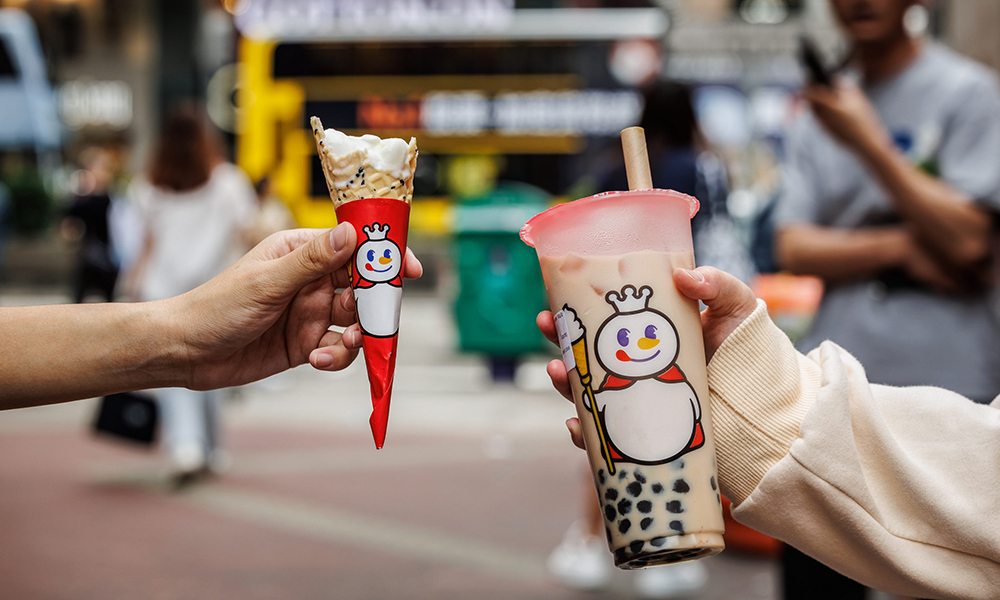
• 或许你会感到意外:全球最大的快餐连锁品牌并非麦当劳(McDonald’s)或星巴克(Starbucks)这类美国品牌,而是1997年创立的蜜雪冰城——这家冰淇淋与奶茶店已在中国及整个亚洲迅速走红。创始人张红超在大学期间便开设了第一家蜜雪冰城摊位,如今已跻身亿万富豪行列。
麦当劳于85年前在加利福尼亚州圣贝纳迪诺市创立。它是全球第二大私营雇主,规模仅次于今年再次荣登《财富》美国500强榜首的沃尔玛(Walmart),并且在全球拥有超4万家门店。
然而,就门店数量而言,麦当劳仍落后于一家公司——蜜雪冰城。
截至3月,蜜雪冰城目前是全球门店数量最多的快餐连锁品牌,在亚洲、澳大利亚、中东及南美洲拥有超4.6万家门店。其中约4万家门店位于中国大陆,这意味着该公司在全球仍有巨大的扩张空间。自今年3月在香港证券交易所上市以来,该公司表现强劲,股价从开盘价每股290港元飙升至周一早盘的584.50港元。
28年前,当张红超开设首家街边小吃摊时,或许从未预想到自己会成为一家行业巨头的创始人。
卑微起点
张红超在河南财经政法大学就读期间萌生了开设小吃摊的念头,主要售卖冷饮、刨冰等饮品。他向祖母借了3000元人民币(按当时汇率约合362美元,如今约合417美元),在河南省会、国际交通枢纽城市郑州街头开设了一个小摊位。
这个摊位从早期就颇为成功。据新浪新闻对蜜雪冰城的长篇报道,张红超能将成本最高1.5元的产品卖出100元以上的高价;换言之,他制作一杯成本约21美分的饮品,售价却能超过14美元。
令人惋惜的是,张红超经验上的欠缺以及郑州的快速现代化成为了阻碍。新浪新闻报道称,随着郑州城市化进程加快,城中村持续面临拆迁,他的摊位在一年内竟接连三次被拆除。而且,他也深切感受到冬季售卖冷饮的艰难处境——这迫使他不得不靠售卖橘子来赚取额外收入。
打磨成功配方
尽管屡遭挫折,张红超仍坚持不懈。他购置更多设备,扩充甜味饮品菜单,并推出关键产品——仅售1元(约合14美分)的软冰淇淋甜筒,这使得该品牌在精打细算的消费者中站稳脚跟。
2007年,弟弟张红甫的加入,让公司的运营能力实现了大幅提升。此前,蜜雪冰城的加盟商多为亲友,管理制度鲜少被严格执行;但自张红甫(现任公司首席执行官)接手后,这种情况发生了改变。(创始人张红超担任董事长。)他极为关键的一项举措是引入店长,这一做法最终助力两兄弟规避了与经营部分加盟店的家族成员间的纠纷。
随着门店数量在多年间扩张至数百家,蜜雪冰城曾面临品控一致性难题,以及水果、奶粉等原料短缺引发的供应链危机。但张红超通过推出珍珠奶茶等新品推动销售额实现反弹,并于2014年建立仓储基地——直接从农户处收购原料,并自主生产奶粉、零食等物料,从根本上整合了大部分供应链,供应问题也随之得以缓解。
2022年,蜜雪冰城已在22个省份建立仓储物流基地,并加强品控管理以规避门店关停风险。蜜雪冰城控制从门店选址、装修,到人员培训、原料供应、食品安全等环节,确保加盟商成功运营。
当前业绩
2024年,蜜雪集团斩获44亿元人民币(约合6.15亿美元)利润,较上年增长22%,营业收入达248亿元人民币(约合34.3亿美元),同比增幅近40%。其每股收益为12.3元人民币(约合1.71美元),较2023年增长41%。根据《金融科技与商业分析》近期发表的一项研究,该公司垂直整合的供应链及自有物流网络使其成本仅占销售收入的30%,而行业平均水平为45%至55%。
关键在于,这家企业仍在持续扩张。2024年新增4192家加盟店,新开门店数量超1万家,关店率仅为3.5%。
尽管其4.5万余家门店中超99%为加盟店,但加盟费在收入中仅占较小比例。据公司透露,收入主要来自向加盟商销售商品与设备,且加盟商必须直接从蜜雪冰城采购。
今年早些时候,蜜雪冰城成功完成首次公开募股,成为港交所年内规模最大的首次公开募股,募资34.5亿港元(约合4.44亿美元)。
至于张氏兄弟,张红超与张红甫虽行事相对低调,但据报道二人合计身家高达81亿美元。(财富中文网)
译者:中慧言-王芳
• 或许你会感到意外:全球最大的快餐连锁品牌并非麦当劳(McDonald’s)或星巴克(Starbucks)这类美国品牌,而是1997年创立的蜜雪冰城——这家冰淇淋与奶茶店已在中国及整个亚洲迅速走红。创始人张红超在大学期间便开设了第一家蜜雪冰城摊位,如今已跻身亿万富豪行列。
麦当劳于85年前在加利福尼亚州圣贝纳迪诺市创立。它是全球第二大私营雇主,规模仅次于今年再次荣登《财富》美国500强榜首的沃尔玛(Walmart),并且在全球拥有超4万家门店。
然而,就门店数量而言,麦当劳仍落后于一家公司——蜜雪冰城。
截至3月,蜜雪冰城目前是全球门店数量最多的快餐连锁品牌,在亚洲、澳大利亚、中东及南美洲拥有超4.6万家门店。其中约4万家门店位于中国大陆,这意味着该公司在全球仍有巨大的扩张空间。自今年3月在香港证券交易所上市以来,该公司表现强劲,股价从开盘价每股290港元飙升至周一早盘的584.50港元。
28年前,当张红超开设首家街边小吃摊时,或许从未预想到自己会成为一家行业巨头的创始人。
卑微起点
张红超在河南财经政法大学就读期间萌生了开设小吃摊的念头,主要售卖冷饮、刨冰等饮品。他向祖母借了3000元人民币(按当时汇率约合362美元,如今约合417美元),在河南省会、国际交通枢纽城市郑州街头开设了一个小摊位。
这个摊位从早期就颇为成功。据新浪新闻对蜜雪冰城的长篇报道,张红超能将成本最高1.5元的产品卖出100元以上的高价;换言之,他制作一杯成本约21美分的饮品,售价却能超过14美元。
令人惋惜的是,张红超经验上的欠缺以及郑州的快速现代化成为了阻碍。新浪新闻报道称,随着郑州城市化进程加快,城中村持续面临拆迁,他的摊位在一年内竟接连三次被拆除。而且,他也深切感受到冬季售卖冷饮的艰难处境——这迫使他不得不靠售卖橘子来赚取额外收入。
打磨成功配方
尽管屡遭挫折,张红超仍坚持不懈。他购置更多设备,扩充甜味饮品菜单,并推出关键产品——仅售1元(约合14美分)的软冰淇淋甜筒,这使得该品牌在精打细算的消费者中站稳脚跟。
2007年,弟弟张红甫的加入,让公司的运营能力实现了大幅提升。此前,蜜雪冰城的加盟商多为亲友,管理制度鲜少被严格执行;但自张红甫(现任公司首席执行官)接手后,这种情况发生了改变。(创始人张红超担任董事长。)他极为关键的一项举措是引入店长,这一做法最终助力两兄弟规避了与经营部分加盟店的家族成员间的纠纷。
随着门店数量在多年间扩张至数百家,蜜雪冰城曾面临品控一致性难题,以及水果、奶粉等原料短缺引发的供应链危机。但张红超通过推出珍珠奶茶等新品推动销售额实现反弹,并于2014年建立仓储基地——直接从农户处收购原料,并自主生产奶粉、零食等物料,从根本上整合了大部分供应链,供应问题也随之得以缓解。
2022年,蜜雪冰城已在22个省份建立仓储物流基地,并加强品控管理以规避门店关停风险。蜜雪冰城控制从门店选址、装修,到人员培训、原料供应、食品安全等环节,确保加盟商成功运营。
当前业绩
2024年,蜜雪集团斩获44亿元人民币(约合6.15亿美元)利润,较上年增长22%,营业收入达248亿元人民币(约合34.3亿美元),同比增幅近40%。其每股收益为12.3元人民币(约合1.71美元),较2023年增长41%。根据《金融科技与商业分析》近期发表的一项研究,该公司垂直整合的供应链及自有物流网络使其成本仅占销售收入的30%,而行业平均水平为45%至55%。
关键在于,这家企业仍在持续扩张。2024年新增4192家加盟店,新开门店数量超1万家,关店率仅为3.5%。
尽管其4.5万余家门店中超99%为加盟店,但加盟费在收入中仅占较小比例。据公司透露,收入主要来自向加盟商销售商品与设备,且加盟商必须直接从蜜雪冰城采购。
今年早些时候,蜜雪冰城成功完成首次公开募股,成为港交所年内规模最大的首次公开募股,募资34.5亿港元(约合4.44亿美元)。
至于张氏兄弟,张红超与张红甫虽行事相对低调,但据报道二人合计身家高达81亿美元。(财富中文网)
译者:中慧言-王芳
• It may surprise you to learn that the world’s largest fast-food chain isn’t an American staple like McDonald’s or Starbucks. It’s actually Mixue, an ice cream and boba shop founded in 1997 that has exploded in popularity in China and throughout Asia. Zhang Hongchao was a university student when he created the first Mixue stall; now he’s a billionaire.
McDonald’s was founded 85 years ago in San Bernardino, Calif. It’s the world’s second-largest private employer—behind only Walmart, No. 1 on the Fortune 500 again this year—and has over 40,000 locations worldwide.
Yet, McDonald’s still falls behind one company in terms of footprint: Mixue Ice Cream & Tea.
Mixue, as of March, is currently the world’s largest fast-food chain by store locations, with over 46,000 sites across Asia, Australia, the Middle East, and South America. Roughly 40,000 of its total locations exist in mainland China, meaning the company has even more room to run globally. And the company’s performed well since its March debut on Hong Kong’s stock exchange, soaring from its opening price of $290 HKD per share to $584.50 HKD as of Monday morning.
Zhang Hongchao probably didn’t expect to be the founder of such a behemoth when he opened his first street-food stall 28 years ago.
Humble beginnings
Zhang was attending the Henan University of Economics and Law when he had the idea to open a food stall, mainly to sell beverages like cold drinks and shaved ice. He asked his grandmother to borrow 3,000 yuan—around $362 back then, or $417 today—to open up a small stall on the streets of Zhengzhou, the capital of China’s Henan province and a major international transport hub.
The stall was successful, even early on. According to a lengthy profile about Mixue in China’s state-run outlet Sina News, Zhang was able to sell products worth up to 1.5 yuan for more than 100 yuan; in other words, he could make a drink that cost around 21 cents and sell it for more than $14.
Unfortunately, Zhang’s inexperience, and the rapid modernization of Zhengzhou, would become obstacles. The villages of Zhengzhou were constantly subject to demolition efforts as the area grew more urban, which resulted in Zhang’s store getting demolished three times in a single year, according to Sina News. And he learned the hard way how difficult it is to sell cold treats during the winter season, which forced him to sell mandarin oranges for extra cash.
Getting the formula right
Despite the setbacks, Zhang kept at it. He bought more machines, added more sugary drinks to his menu, and notably introduced a soft-serve ice cream cone for just 1 yuan, or roughly 14 cents, which solidified the brand among budget-conscious consumers.
The company also got stronger operational chops when Zhang brought in his younger brother, Hongfu, to help run the company in 2007. Since so many of Mixue’s franchisees were run by friends or family, few enforced Zhang’s rules or regulations; that changed when Hongfu, who now acts as the company’s CEO, took the reins. (Elder brother Hongchao Zhang, the founder, serves as chairman.) One of the most important things Hongfu did was introduce store managers, which ultimately helped the two brothers avoid disputes with family members who operated some of their franchises.
As Mixue added hundreds of stores over the years, the company grappled with quality and consistency issues, as well as supply-chain woes when fruits or milk powder ran in short supply. But sales rebounded as Zhang pushed for new products like boba tea, and supply issues were ameliorated when Zhang decided to establish a storage base in 2014 that would collect raw materials from farmers, and produce its own materials like powders and snacks, essentially consolidating a large portion of its supply chain.
In 2022, Mixue reported having warehouse and logistics bases in 22 different provinces, and the company has stepped up quality-control efforts to avoid store closures. Mixue controls site selection, store decoration, personnel training, raw material supply, and food safety to ensure the success of its franchisees.
Current success
In 2024, Mixue reported 4.4 billion yuan ($615 million) in profit, up 22% over the year before, on 24.8 billion yuan (about $3.43 billion) in revenue, which was a near-40% jump year over year. Its earnings per share, 12.3 yuan ($1.71), was also up 41% from 2023. The company’s vertically integrated supply chain and proprietary logistics network have helped keep costs low at just 30% of its sales revenue, compared to the industry average of 45%–55%, according to a recent study published in the Journal of Fintech and Business Analysis.
Crucially, the company continues to expand. It added 4,192 new franchisees in 2024 and opened over 10,000 new stores, with a closure rate of just 3.5%.
While over 99% of its 45,000-plus stores are franchised, franchise fees only make up a small percentage of its revenue. According to the company, the bulk of its income comes from selling merchandise and equipment to franchises, which are required to buy these items directly from Mixue.
Earlier this year, Mixue celebrated a successful initial public offering, the biggest IPO of the Hong Kong Stock Exchange so far this year, raising $3.45 billion HKD, or $444 million.
As for the Zhang brothers, Hongchao and Hongfu maintain relatively low profiles, but reportedly have a combined net worth of $8.1 billion.






